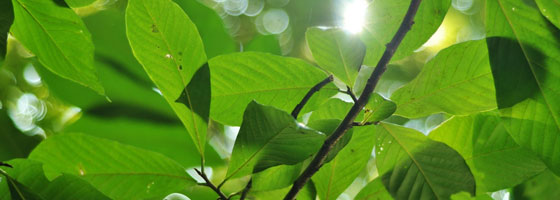What is Photosynthetically Active Radiation?

UPDATE: Fondriest Environmental is offering their expertise in photosynthetically active radiation through their new online knowledge base. For an updated and comprehensive look at PAR and its importance to environmental and water quality, check out: Photosynthetically Active Radiation.
Photosynthetically Active Radiation (PAR) is the amount of light available for photosynthesis, which is light in the 400 to 700 nanometer wavelength range. PAR changes seasonally and varies depending on the latitude and time of day.
Levels are greatest during the summer at mid-day. Factors that reduce the amount of PAR available to plants include anything that reduces sunlight, such as cloud cover, shading by trees, and buildings. Air pollution also affects PAR by filtering out the amount of sunlight that can reach plants.
Why is Photosynthetically Active Radiation Important?
Photosynthetically Active Radiation is needed for photosynthesis and plant growth. Higher PAR promotes plant growth, and monitoring monitoring PAR is important to ensure plants are receiving adequate light for this process.
PAR values range from 0 to 3,000 millimoles per square meter. At night, PAR is zero. During mid-day in the summer, PAR often reaches 2,000 to 3,000 millimoles per square meter.
How is Photosynthetically Active Radiation measured?
Photosynthetically Active Radiation (PAR) is reported as millimoles of light energy per square meter.
Photosynthetically Active Radiation Technology
Photosynthetically Active Radiation (PAR) is measured by a silicon photovoltaic detector. This detector measures light in the 400 nanometer to 700 nanometer range.
Some PAR sensors measure the PPFD of photosynthetically active radiation. PPFD stands for photosynthetic photon flux density and is used to quantify PAR. This is the most popular type of light sensor among plant biologists, horticulturists, ecologists, and other environmental scientists.




Pingback: New form of photosynthesis that’s above par « Botany One
Pingback: Best LED Grow Lights 2019 – 300W, 450W, 600W, 1000W, 1200W, 1500W, 2000W - The Daily Gardener
Pingback: The Ultimate LED Aquarium Lighting Guide - Aquariums Lights
Pingback: Best LED Aquarium Light for Plants (2021 Review & Buying Guide)
Pingback: Importance of PAR for Cannabis | Premium Cultivars
Pingback: LED Grow Light Veg Bloom or Both? Choose Wisely! – My WordPress
Pingback: How Much Direct Sunlight Does A Golden Barrel Cactus Need? - CactusWay
Pingback: What Is A Good Par Output For Led Grow Light | GardeningLeave
Pingback: What is Diffuse Radiation? - Energy Theory